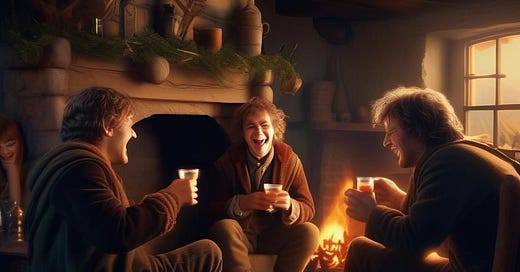Exemplars of Friendship: Hobbits
Ah, for the stirring and stubborn statements of friends who just won’t leave you alone!
I have the current privilege of teaching a course on The Lord of the Rings this year through Homeschool Connections, quite simply the greatest collection of online courses for homeschool students. Each week, the students and I gather virtually to discuss Tolkien’s magnum opus.
One of the chapters we delved into recently was “A Conspiracy Unmasked” in Fellowship of the Ring. Frodo has left Bag End, and is on his way to Crickhollow in Buckland. Merry and Fatty Bolger have gone ahead to set up his new house, and Sam and Pippin are hiking with Frodo across the Shire. Of the hobbits, only Frodo and Sam know anything of the dangerous quest ahead to destroy the Ring.
Or so Frodo thinks.
Frodo feels, given the danger, that the only thing to do is sneak out early from Crickhollow, and travel by himself, his desire the safety of his friends. Finally getting up the nerve to tell all his friends, it is suddenly revealed by Merry that he and the other hobbits know a great deal more of Frodo’s plight than they have previously let on.
This takes Frodo completely aback, and he gets more and more stunned and shocked the longer Merry speaks about how much he, Pippin, Sam, and Fatty Bolger know about Frodo’s troubles, Ring and all. Frodo begs leave of his friends to go off on his journey alone, considering the dangers which lie ahead. It is here that Merry, Pippin, and Sam put their hairy foot down:
‘You do not understand!’ said Pippin. ‘You must go – and therefore we must, too. Merry and I are coming with you. Sam is an excellent fellow, and would jump down a dragon’s throat to save you, if he did not trip over his own feet; but you will need more than one companion in your dangerous adventure.’
‘My dear and most beloved hobbits!’ said Frodo deeply moved. ‘But I could not allow it. I decided that long ago, too. You speak of danger, but you do not understand. This is no treasure-hunt, no there-and-back journey. I am flying from deadly peril into deadly peril.’
‘Of course we understand,’ said Merry firmly. ‘That is why we have decided to come. We know the Ring is no laughing-matter; but we are going to do our best to help you against the Enemy…
You can trust us to stick to you through thick and thin – to the bitter end. And you can trust us to keep any secret of yours – closer than you keep it yourself. But you cannot trust us to let you face trouble alone, and go off without a word. We are your friends, Frodo. Anyway: there it is. We know most of what Gandalf has told you. We know a good deal about the Ring. We are horribly afraid – but we are coming with you; or following you like hounds.’
Ah, for the stirring and stubborn statements of friends who just won’t leave you alone! Our unfortunate day and age seems one more of detachment from others rather than immutable bonds of loyalty. However, it was not always thus, nor shall it always be. And even today, when our attention is pulled every which way and sundry, shows wonderful examples of that embedded virtue of true friendship. It has not been a rare occurrence for me to see friends come out of the woodwork when tragedy or trauma strikes, to coalesce together once more and offer solace and fellowship in need.
CS Lewis once asked in the The Four Loves “Why Friendship?” In his mind, he concluded that it was the most unnecessary bond in human relations, neither oriented toward procreation or family solidarity. And yet, it was more of a gift, perhaps, and reminiscent of agape, that most holiest of loves, than the formers. Why was that? It lies in the very idea itself of the “unnecessary”- it is not given or received as a mode of survival, but a very flavor of living. And, of course, a gift marks the presence of a Gift-Giver. As CS Lewis says later in his meditations:
A secret Master of the Ceremonies has been at work. Christ, who said to the disciples “Ye have not chosen me, but I have chosen you,” can truly say to every group of Christian friends “You have not chosen one another but I have chosen you for one another.” The Friendship is not a reward for our discrimination and good taste in finding one another out. It is the instrument by which God reveals to each the beauties of all the others. They are no greater than the beauties of a thousand other men; by Friendship God opens our eyes to them. They are, like all beauties, derived from Him, and then, in a good Friendship, increased by Him through the Friendship itself, so that it is His instrument for creating as well as for revealing. At this feast it is He who has spread the board and it is He who has chosen the guests. It is He, we may dare to hope, who sometimes does, and always should, preside. Let us not reckon without our Host.
A feast? Well, no wonder hobbits are present, and indeed, some of the greatest exemplars of this gift. A toast then, to our Host, in appropriate hobbit-fashion, for friendships and fellowships without end, Amen!




